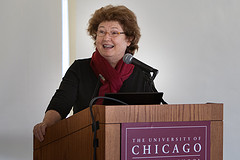Ane Alencar
Geographer, IPAM — Instituto de Pesquisa Ambiental da Amazônia, Brasília, DF
The Role of Extractive Reserves and Sustainable Development in the Reduction of Deforestation and in Forest Preservation in the Amazon
Historically, the Extractive Reserves and the Reserves of Sustainable Development have played a critical role in the effort to avoid the emissions of greenhouse gases. These gases enter the atmosphere as a result of forest burning and other deforestation techniques. The Reserves occupy 19% of the designated area for Units of Conservation, as these reserves are known, in the Amazon, and 8% of the forest area in the region. These UCs have lost only 1% and 3%, respectively, of their original area. Moreover, they account for approximately 3 billion tons of carbon dioxide, a value superior to that of the curbed emissions determined by the Kyoto Protocol (circa 2 billion tons). The preservation of these resources depends entirely on the social and economic sustainability of the families that engage in extractive practices. These families need the forest alive in order to develop their economic activities and to use it as their source of subsistence and income.
This debate focuses on the benefits and compensation attributed to efforts on “Reduction of Emissions and Degradation,” and on the protection of the forest. To produce a meaningful conversation, it is critical to recognize the role that the populations that engage in extractive practice have played to strengthen those efforts. Therefore, it is necessary to acquiesce to these populations’ demand for better quality of life and for the protection of their territory. These demands may be accommodated by encouraging productive activities compatible with the preservation of the forest, by consolidating their territory and investment, or even by strengthening the populations’ social organizations.
Ane Alencar holds a Bachelor’s degree in Geography from the Universidade Federal do Paraná and a Master’s degree in Geographic Information Systems from Boston University. She is a Ph.D. candidate in Natural Resources Conservation at the University of Florida. Ms. Alencar coordinates the Program on Regional Planning at IPAM, which develops models for the use of land as a tool for discussions on public policies. These discussions intend to reduce the emissions that result from deforestation and forest degradation.




